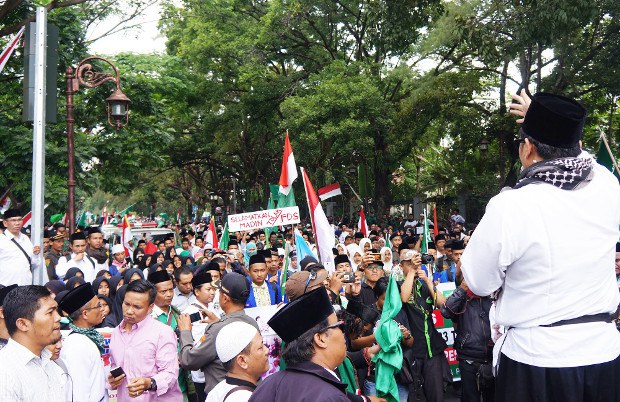Muslim Group Protests Indonesia’s Planned Switch to Five-Day School Week
2017.08.24
Solo, Indonesia
 A speaker addresses a rally protesting the new five-day school week in Solo, Indonesia, August 24, 2017. \
A speaker addresses a rally protesting the new five-day school week in Solo, Indonesia, August 24, 2017. \
An Indonesian government plan to lengthen the school day by 90 minutes while shortening the school week from six to five days has encountered resistance from Muslim groups who say it will harm after-school Islamic education.
Thousands of members of Indonesia’s largest and most liberal Muslim organization, Nahdlatul Ulama (NU), marched in the city of Solo, Central Java Thursday, chanting, “What will become of Indonesia without madrasas?”
“Full day school regulations mean the government is keeping children away from pesantren. This is very threatening because the morality of the next generation can decline,” said Kyai Haji Mubarok, coordinator of the Solo area branch of NU.
There are about 400 registered madrassas (pesantren), and an estimated 4,000 informal religious schools in the Solo area, according to Muhammad Mahbub, a rally organizer who said that 25,000 people had attended. Police put the number at 10,000.
Mahbub and Mubarok called for the central government to revoke its so-called Strengthening Character Education Program, which is to be formalized via a presidential decree in September.
Some schools already started the new schedule when the academic year got under way in July. Now, instead of six and a half hours, Monday through Saturday, those schools are open eight hours, Monday through Friday.
The central government, acknowledging complaints about the change, has already backtracked and announced that it is optional.
“I need to tell you that five-day school policy or Full Day School is not compulsory,” a statement posted on the Indonesian Cabinet Secretariat website on Aug. 10 quoted President Joko Widodo as saying.
The statement was made in response to protests from various parties over the new Ministry of Education and Culture regulation setting an eight-hour, five-day schedule, or full day school, it said.
Nahdlatul Ulama believes the policy impedes children from taking religious education in the afternoon, it noted.
Teacher workday
At a parliament hearing in June, Minister of Education and Culture Muhadjir Effendy said the new schedule was needed to boost teacher performance, although he did not say how the change would accomplish that.
“After decades of assessments, teachers performance is not satisfying in the field,” Indonesian media outlet JawaPos quoted him as saying.
The government also wants to adjust the work hours of teachers to conform with other civil servants, he said.
Muhadjir declined to comment when contacted by BenarNews about Thursday’s demonstration, except to say people should wait for the upcoming presidential decree.
Asked if the policy would still be announced despite the protests, Muhadjir said, “those who agree with it are keeping silent.”
The Solo city government initially rejected the new schedule but is now considering implementing it in stages.
“This policy has been thoroughly studied and it is hoped it can improve the quality of education,” said the city’s deputy mayor, Achmad Purnomo.
Pros and cons
Siswanti, 45, the mother of a high school student in Klaten, Central Java, said her daughter has been too tired to do chores at home since the longer school day went into effect in July.
“Getting home from school, she doesn’t want to do anything, not even study,” Siswanti told BenarNews.
Siswanti said she was giving her daughter twice as much spending money due to the longer school day.
Ernawati, 40, who also attended the protest, said she didn’t want her child to be in school until afternoon, and to miss out on religious studies with friends at the Quran learning center near their home.
“Interactions with family and neighbors will also be reduced,” she said. “Won’t it?”
But Wahyuni, 47, whose son attends high school in Klaten, said that he is getting less homework than before, and she no longer has to pay for after-school tutoring.
“Now he doesn’t need extra tutoring that would keep him out late. Now at 4 p.m. he’s already home,” she said.







